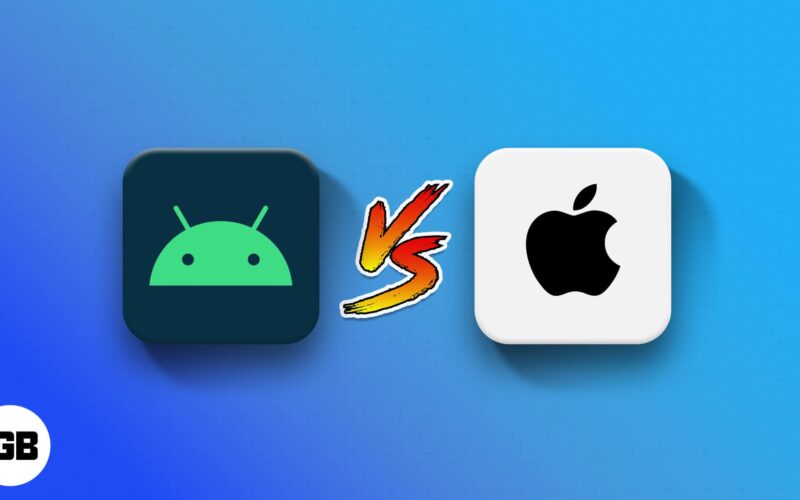Buying a new smartphone? Congratulations! But which one – iPhone or Android? The iPhone vs. Android debate is as old as time and isn’t phasing out anytime soon. On the surface, both devices may feel similar as they offer great features, but there are some massive differences.

This article offers an in-depth comparison of some critical aspects of both. Let’s go through them and help you decide whether you should buy an iPhone or Android device.
- iPhone vs. Android: Performance
- iPhone vs. Android: Software Compatibility
- iPhone vs. Android: Continuity Features
- iPhone vs. Android: Camera
- iPhone vs. Android: Privacy
- iPhone vs. Android: Security
- iPhone vs. Android: Pricing
- iPhone vs. Android: Sales
- Final take: Which one is better iPhone or Android
iPhone vs. Android: Performance
While many say iPhone is better than Android, many believe vice-versa. However, over the last few years, both iPhones and Androids have shown huge increments in performance. The increased RAM, storage, and regular software updates have made them neck-to-neck competitors. But let’s talk about their heart – processor!
iPhones come with Apple’s in-house A-series chips, whereas popular Android devices come with Qualcomm’s Snapdragon chipsets. Moreover, with the arrival of the iPhone SE, Apple entered the mid-range segment, and that’s where things got interesting in performance.
For context, I have compared the iPhone SE and Google Pixel 4a, two of the best cheap phones of 2020, and the high-end Samsung Galaxy S21 Ultra.
iPhone SE vs. Pixel 4a vs. Samsung Galaxy S21 Ultra
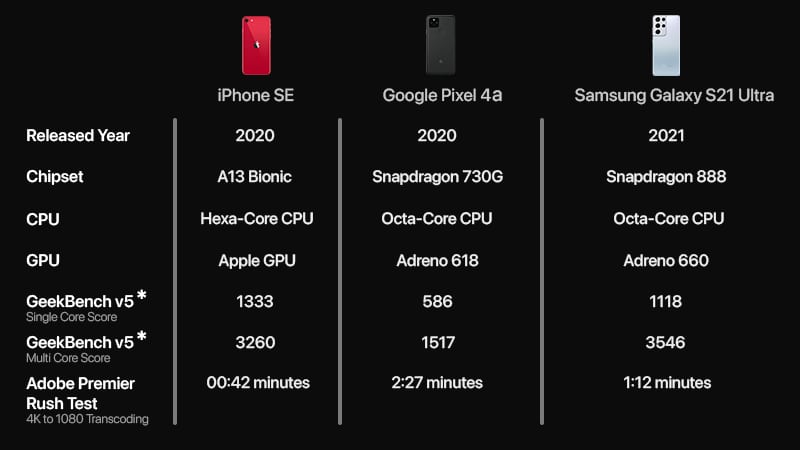
What is GeekBench v5 score?
GeekBench v5 is a synthetic benchmarking platform used to test the device’s performance and rank it among others. The higher the score, the better the device.
A single core score represents the capability of the hardware for day-to-day tasks. In simpler terms, it translates hardware’s performance.
Here, the iPhone SE is a clear winner. The device is almost 20% faster than the high-end S21 Ultra.
A multi-core score is used to rank the device according to its endurance to multi-threaded tasks where your CPU might be stressed to its best. However, it doesn’t matter much if you don’t have heavy usage.
Samsung Galaxy S21 Ultra has a higher multi-core score. This means that it can handle resource-extensive tasks much better than the other two.
Apple A-series chips vs. Qualcomm Snapdragon chips
The A13 Bionic-powered iPhone SE easily beats its counterpart, Pixel 4a, powered by Qualcomm’s Snapdragon 730G. But what’s more surprising is that A13 Bionic also beats this year’s Android flagship, the Samsung Galaxy S21 Ultra, powered by Qualcomm’s top-of-the-line Snapdragon 888 SoC and Octa-core CPU in day-to-day usage.
Although the S21 Ultra wins in the battery, charging, and display refresh rate, iPhone SE takes the cake for offering more value for money and blazing fast speed.
However, if you are willing to shell out more money, it’s better to buy an A14-powered iPhone from the 12 series or wait for iPhone 13 scheduled to release later this year.
Winner: iPhone
iPhone vs. Android: Software compatibility
Android is huge and way too fragmented. It has different manufacturers for hardware and software, making it difficult for companies to promise timely updates. Meanwhile, Apple is solely responsible for iPhone’s software and hardware, giving it more control over the updates.
Moreover, iPhones have much better software support. For instance, take the 5-year old iPhone (iPhone 6S). It supports the latest iOS 15 update. Meanwhile, some Android OEMs, including Google, Samsung, and OnePlus, started supporting phones up to 3 years of their launch. Still, it’s nowhere near what Apple offers.
Hence, if you need the latest OS version, go for iPhone. Further, the ease and convenience that iOS offers make the iPhone a lucrative option. Let’s discuss this in detail in the next point.
Winner: iPhone
iPhone vs. Android: Continuity features
The whole ecosystem surrounding the iPhone is so seamless that if you own multiple Apple devices, you can continue your work right where you left on any device with the features like handoff, universal control, and universal clipboard.
For instance, if you are working on your MacBook or iPad, you can directly use it to pick calls or reply to messages without going back to your iPhone.
Meanwhile, Android phones don’t have these features integrated due to obvious reasons – different manufacturers. However, there are workarounds if you wish to use this feature, but there’s no easy way to implement it.
In a nutshell, Apple emphasizes its ecosystem and offers ease which makes many users choose iPhone. If you have an existing Apple device or plan to buy it at a later stage, investing in an iPhone is wise.
Winner: iPhone
iPhone vs. Android: Camera
The camera is one of the primary reasons why many people buy an iPhone. But that doesn’t mean Androids fall back in this aspect. Let’s see each one by one.
iPhones offer a natural color reproduction with plenty of detail, making them a default camera for photography enthusiasts and masses.
Moreover, the videography on iPhones is one of the best in the smartphone industry. In case you didn’t know, several award-winning movies were shot on iPhone, like Snow Steam Iron, Searching For Sugar Man (an Oscar-winning documentary), which says a lot about iPhone’s camera performance.
However, several Android phones offer a Pro mode which is not yet seen on iPhones. Pro mode allows you to play with ISO, shutter speed, and other aspects of the camera. It will be appreciated if Apple brings it to the iPhone’s camera in the future.
Additionally, some Android devices offer mind-blowing features. Like S21 Ultra offers up to 100X zoom, Pixel 5 boasts an ultra-wide lens, and so on.
You can view the video below from MacRumors, which beautifully highlights the differences between the iPhone 12 Pro Max and the Samsung Galaxy S21 Ultra camera.
iPhone vs. Android: Security
Android OEMs are not as stringent as Apple’s when it comes to security. In other words, it’s easier to plan a malware attack on Android than iOS.
Become an iGeeksBlog Premium member and access our content ad-free with additional perks.
It’s pretty evident since Apple got rigorous compliance for the App Store. Why do I bring the App Store in between?
- According to a recent academic study (the largest one of its kind carried to date), Google Play Store is identified as the primary source of malware installed on Android devices. Moreover, researchers determined that between 10% to 24% of the analyzed apps could be described as malicious or unwanted.
Besides, in a recent interview at the VivaTech conference, Tim Cook said Android has 47 times more malware than iPhone’s iOS.
It isn’t that iPhones are immune to such security threats. But the chances of falling prey to malware are much lower in iPhone than Android devices.
Winner: iPhone
iPhone vs. Android: Privacy
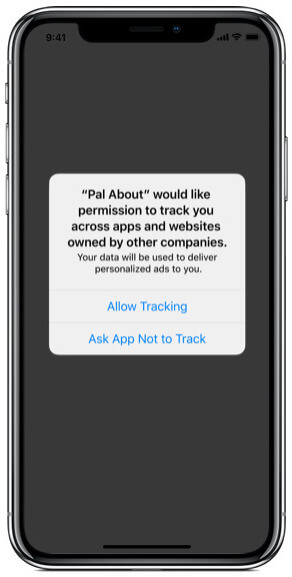
It’s a no-brainer to guess the winner when it comes to privacy! Apple has always prioritized user privacy and taken care in reducing the amount of data leaving your device.
In addition, the giant introduced plenty of (controversial) measures like Privacy Indicator, Privacy Labels followed by App Tracking Transparency to fight against the advertisement models of platforms like Facebook.
Check this ad by Apple promoting its privacy features.
On the other hand, Android is nowhere close to taking such a big step. Why? Because Google’s business model surrounds data mining.
Winner: iPhone
iPhone vs. Android: Pricing
So iPhone’s are not cheap, and still, many consider owning an iPhone a luxury. But, over the last few years, Apple has been trying to make iPhones more affordable with models like iPhone 12 mini and iPhone SE.
On the other hand, Android is primarily why smartphones are popular and widely used. Android handsets start as low as below $100, costing way less than what Apple asks for the base iPhone SE selling at $399. Hence, making them a pretty affordable choice.
Some premium Android smartphones are also available, such as Samsung Galaxy S21 Ultra starting at $1199.99 and Galaxy Fold Z 2, which debuted for $1,999.99 in the USA.
Well, paying a few bucks extra for an iPhone would even fetch you a few more dollars while you’re out there selling it for another one. Look at how resale value for iPhones compares against Android phones in the following section.
Winner: Android
Resale value
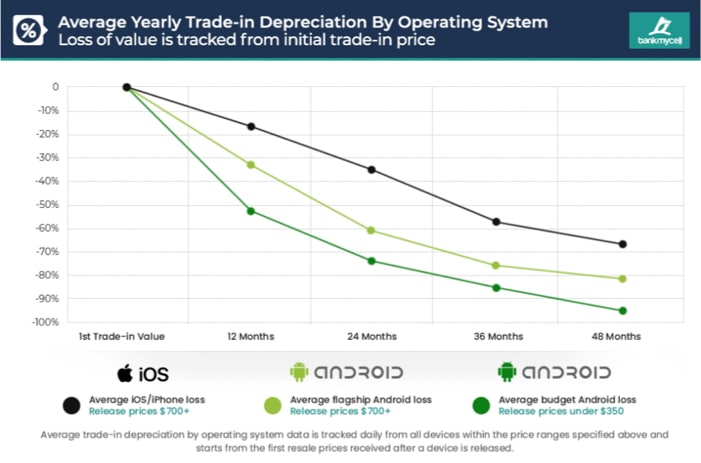
To make up for the expense, iPhones offer a better resale value than Android smartphones.
Usually, you would get 30-40% of what you paid for your Android smartphone, whereas selling an iPhone after a year or two of use would get you at least 60% of its retail price.
Here’s a detailed depreciation table for your reference
| iPhone | Flagship Android | Budget Android | |
| Day 1 trade-in value | $850 | $850 | $205 |
| Year 1 | $651 | $466 | $105 |
| Year 2 | $464 | $243 | $42 |
| Year 3 | $310 | $175 | $27 |
| Year 4 | $208 | $142 | $19 |
So, it is wiser to invest in an iPhone instead of buying a flagship Android smartphone.
Winner: iPhone
iPhone vs. Android: Sales
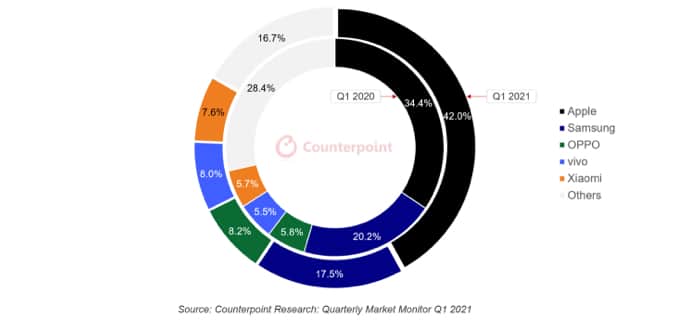
So numbers are something that decides if you’re winning or losing the game, and these numbers have spoked! Apple is obviously ahead of some giant Android OEMs.
But what’s the reason? Consumer Loyalty! Yes, iPhone users are some of the most loyal users in the whole market, and that’s because of Apple’s ecosystem.
According to a survey done by SellCell.com, the brand loyalty for Apple is at an all-time high, whereas there’s another contrasting report suggesting that more and more iPhone users are shifting to Android.
Could this be due to not getting a charger in the box or people supporting small businesses? I don’t know the exact reason behind this, but why don’t you let me know what you think in the comments below?
Final take: Which one is better iPhone or Android?
Well, I have nothing against Android, and neither am I fanboying over iPhones. There are some exceptionally good phones in the Android ecosystem, and they do have their advantage over the iPhone.
However, iPhones got an edge over Android devices in several aspects, and that’s why you see more and more people shifting to iPhones lately.
Whose side are you on in the iPhone vs. Android debate? Let us know in the comments below?
Read more:

